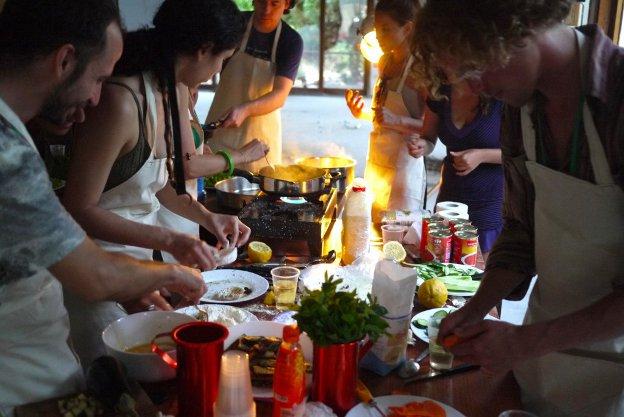Unfinished Business’ Only Wolves and Lions was inspired by a quote from the Greek philosopher Epicurus: ‘Only wolves and lions eat alone, you should not eat, not even a snack, on your own.’ The show’s creator, Leo Kay, has brought together research into community, isolation, crisis and happiness to create this immersive experience. The event is produced by Anna Smith (the other half of Unfinished Business) and performed by Leo and co-deviser Unai Lopez de Armentia, and takes the form of an evening of cooking together, eating together, and talking together – a natural-enough situation (for those of us who still meet together to eat together, anyway!) with some performance provocations mixed in.
We gather around the tables and have all brought an ingredient. These are presented and a list is written on the blackboard: greens, peppers, lentils, mangoes, garlic. We also have some staple ingredients on the side: herbs, spices, rice, flour, potatoes. Leo and Unai sit at each end of the table and with cue-cards begin the conversation. They propose a toast to crisis, to danger and to opportunity, the first of many toasts. Leo and Unai talk about the chimpanzee society, which is patriarchal and aggressive, and the bonobo monkey community, which has a strict social structure that is matriarchal with a free love vibe, the contrast between these two monkey societies making for an interesting study to reflect on our own society. We perform the Bonobo shake down, howling and screaming the mating call at each other. This is the icebreaker, the warm-up, and strips us back to our animal selves.
After another philosophical reflection on instant gratification versus biding time, we toast to ‘not having everything we love, but loving everything we have’, and in pairs we plan three recipes with the ingredients we have before us – we don’t have long so the creative ideas flow quickly and in an energetic panic. Next, we collectively decide as a group which recipes to go with.
Around us are stoves, pans and utensils, on our chairs are cotton aprons that we are encouraged to wear, and we have 45 minutes to cook our imagined delicacies. Anna, Unai and Leo are on hand to boil water, peel vegetables and watch over bubbling pots. The 45 minutes fly past as everyone is completely engrossed in their dish. Some people are making something they know well, some are cooking simple dishes, some (like myself) are completely making it up as they go along. As the time approaches the dishes make there way to the tables and a terrific spread is before us.
Our midnight feast is wonderful, as everyone asks about each other’s dishes and people take pride in successfully delivering a luxurious meal. During dinner Unai has a story to tell us; it is about being a child in his native Basque country, and about a traditional day when all the women in his family cook up a meal while the men are out drinking. He tells this story with nostalgic happiness and tells us that this doesn’t happen any more. Why is this? Is it because the women are fed up of doing all the work? Is it because when our grandparents die the solidity of tradition dies with them? Why is dining together important? How can we make it work in the modern world? The conversation floats around the table as everyone uses their own personal histories to contemplate the question. There is a realisation that there comes a point in everyone’s life when you unerstand that you have to be the one to carry on a tradition – or begin a new one. We have a three-minute silence for old traditions, and in this silence I made a promise to myself.
Only Wolves and Lions is a very personal piece, experienced within a community that is formed very quickly through cooking and eating and talking. Each person leaves with their own revelation of how to do something different, or appreciation for what they already have. The work ends with an Afro-Brazilian song, each of us with a handful of salt, flour or rice, stamping in rhythm and singing loudly. We get faster and faster and faster and then throw our handfuls into the air – and they scatter over the dinner table to signify the end of the show.
The immediacy of having to cook up something, and eating wonderful food makes for a pleasant evening – but the show is more than just fun. It is thought-provoking and gets to the heart of questions of community and tradition key to our lives as human beings.


